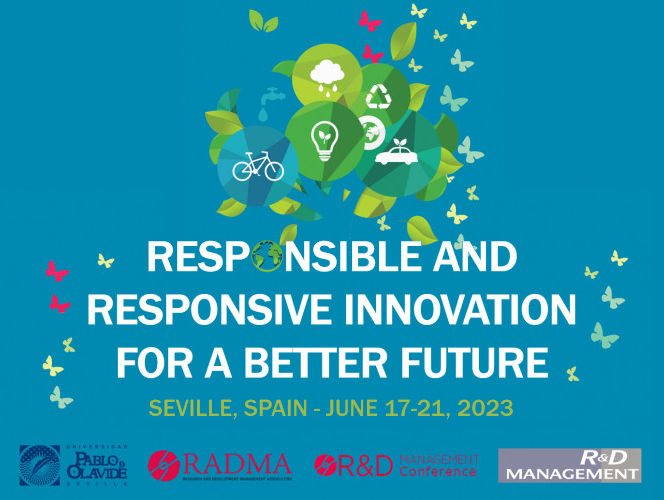Many companies adopt industry standards to guide the adoption of best practice and some of them are certifiable such as ISO 9001 or ISO 14001, among others. Research has shown that adoption of standards have many benefits for firms, but there is still potential for them to hinder innovation, with many firms de-certifying in order to pursue radical innovation strategies.
The challenge arises how can regulations, standards and intellectual property (IP) management support the implementation of successful sustainable open innovation practices?

One of the tracks of the 2023 R&D Management Conference is exploring this issue and we asked co-chair Alfonso Hernandez-Vivanco PhD, Tenure-track lecturer at the Business Department of the University of Barcelona, for his views.
Q. Do standards have a role in solving grand challenges?
A. Standards are technical specifications conceived to serve as guidelines for best practices. Thus, in a sense, we could think of them as a set of predefined conditions that settle the boundaries and limit the possibilities for creating and innovating. According to this reasoning, the sole idea of standards playing a role for promoting (sustainable) innovation could be deemed disrupting.
More broadly speaking, not only standards, but also management systems that englobe some of the most widespread standards (such as ISO 9001 for quality management systems, ISO 14001 for environment, etc.) could play a role in shaping sustainable innovation.
According to recent studies, formal standards are perceived to positively contribute to achieving the Sustainable Development Goals. This has very serious implications as it means that management system standards (e.g., ISO 9001, ISO 14001, among others) are potential drivers towards solving the grand challenges.
Q. How does implementing a management systems benefit a firm?
A. Research has found that integrating management systems enables proper mechanisms within firms to understand and respond to diverse stakeholders’ needs.
What is interesting about this view is that firms need not necessarily certify their management systems to attain significant improvements in terms of sustainable innovation and improve firm performance; indeed, getting certified of such standards does not necessarily ensure this. Instead, what is relevant is the effective application of the main principles embedded in management systems themselves.
However in this area, we must also acknowledge the increasing trend of firms withdrawing from management system standards, specially in more developed countries. This organizational shift could have significant implications for firms that change the way of doing things, including innovating, responding to stakeholders’ needs and operating.
Recent findings are shedding new light on the way these dynamics affect certain types of innovation, but further research is required to improve our knowledge on this ongoing discussion.
Q. What is the link between de-certification and radical innovation?
A. Other interesting recent findings, in my opinion, are related to the implications of certifications and de-certifications for innovation in terms of the level of radicalness.
In this line, recent research suggests that firms opting for being certified of quality management systems (e.g., ISO 9001) tend to develop more incremental innovations, whereas those that de-certify of such standards tend to develop more radical innovations.
These findings are revealing since the dynamics involved in (de)certification processes could have relevant consequences on the innovation process and orientation towards incremental or radical innovations.
In this line, it is also worth noting that the increasing trend of massive management system standards withdrawals in the developed world is a relatively new phenomenon, and there is still much that we can (and need to) learn about it and to understand more in-depth.
Q. If someone was new to this topic what would you suggest they read to get a quick overview of the issues?
To get a really brief overview, I would suggest newcomers to this topic to have a look at the summary, published by Emerald, of award-winning research. The study was conducted in the framework of my PhD thesis focused on this topic (Hernandez-Vivanco, 2018). This summary includes a very useful infographic that summarizes some of the dynamics involved in management systems (standards) and innovation in pursue of firms’ sustainability. This summary and infographic can be found in this link:
https://www.emeraldgrouppublishing.com/emerald-efmd-outstanding-doctoral-research-awards
For more specific readings, I would recommend the following articles (see below for full references):
- Management systems (standards) related to sustainable innovation: Hernandez-Vivanco et al. (2018), Hernandez-Vivanco & Bernardo (2022) and Valero-Gil et al. (2023)
- Management systems (standards) related to firms’ sustainability: Ronalter et al. (2022), Ronalter & Bernardo (2023) and Vieira Nunhes et al., (2022)
- Management systems’ standards de-certification related to innovation radicalness: Clougherty & Grajek (2023)
- Standards related to SDGs: Blind & Heß (2023)
References
- Blind, K., & Heß, P. (2023). Stakeholder perceptions of the role of standards for addressing the sustainable development goals. Sustainable Production and Consumption, 37, 180–190. https://doi.org/10.1016/j.spc.2023.02.016
- Cândido, C. J. F., & Ferreira, L. M. F. R. (2023). ISO 9001 internal decertification motivations: exploring barriers and benefits of certification as withdrawal antecedents. Production Planning & Control, 34(4), 330–344. https://doi.org/10.1080/09537287.2021.1916638
- Clougherty, J. A., & Grajek, M. (2023). Decertification in quality-management standards by incrementally and radically innovative organizations. Research Policy, 52(1), 104647. https://doi.org/10.1016/j.respol.2022.104647
- Hernandez-Vivanco, A. (2018). Understanding Innovation within the context of the Integration of Management Systems. http://diposit.ub.edu/dspace/bitstream/2445/123782/1/AAHV_PhD_THESIS.pdf
- Hernandez-Vivanco, A., & Bernardo, M. (2022). Are certified firms more prone to eco-product innovation? The moderating role of slack resources. Journal of Cleaner Production, 377, 134364. https://doi.org/10.1016/j.jclepro.2022.134364
- Hernandez-Vivanco, A., Bernardo, M., & Cruz-Cázares, C. (2018). Sustainable innovation through management systems integration. Journal of Cleaner Production, 196, 1176–1187. https://doi.org/10.1016/j.jclepro.2018.06.052
- Hernandez-Vivanco, A., Domingues, P., Sampaio, P., Bernardo, M., & Cruz-Cázares, C. (2019). Do multiple certifications leverage firm performance? A dynamic approach. International Journal of Production Economics, 218, 386–399. https://doi.org/10.1016/j.ijpe.2019.07.016
- Ronalter, L. M., & Bernardo, M. (2023). Integrated management systems and sustainability – a review on their relationships. Total Quality Management & Business Excellence, 1–31. https://doi.org/10.1080/14783363.2023.2178407
- Ronalter, L. M., Bernardo, M., & Romaní, J. M. (2022). Quality and environmental management systems as business tools to enhance ESG performance: a cross-regional empirical study. Environment, Development and Sustainability. https://doi.org/10.1007/s10668-022-02425-0
- Valero-Gil, J., Surroca, J. A., Tribo, J. A., Gutierrez, L., & Montiel, I. (2023). Innovation vs. standardization: The conjoint effects of eco-innovation and environmental management systems on environmental performance. Research Policy, 52(4), 104737. https://doi.org/10.1016/j.respol.2023.104737
- Vieira Nunhes, T., Espuny, M., Lauá Reis Campos, T., Santos, G., Bernardo, M., & Oliveira, O. J. (2022). Guidelines to build the bridge between sustainability and integrated management systems: A way to increase stakeholder engagement toward sustainable development. Corporate Social Responsibility and Environmental Management, 29(5), 1617–1635. https://doi.org/10.1002/csr.2308
R&D Management Conference 2023: Responsible and Responsive Innovation for a Better Future
Pablo De Olavide University, Spain, 17-21 June 2023
7.2. Regulations, Standardization and IP management in sustainable open innovation
Track Chairs: Alfonso Hernandez-Vivanco, Universitat de Barcelona
Vesna Vlaisavljevic, Universitat de Barcelona
Claudio Cruz Cázares, Universitat de Barcelona


